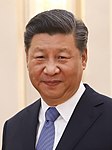Xi Jinping Administration
This article may be expanded with text translated from the corresponding article in Chinese. (October 2019) Click [show] for important translation instructions.
|
| Xi Jinping Administration 习近平体制 | |
|---|---|
5th generation Communist leadership of the People's Republic of China | |
| Incumbent | |
 6th Paramount leader Xi Jinping | |
| Date formed | 15 November 2012 |
| People and organisations | |
| Head of state | Xi Jinping |
| Head of government | Li Keqiang |
| Member party | Chinese Communist Party-led United Front |
| History | |
| Election(s) | October 2012 to February 2013 October 2017 to February 2018 |
| Legislature term(s) | XII, XIII |
| Predecessor | Hu Jintao Administration/ Xi–Li Administration |
| Xi Jinping Administration | |||||||||||
|---|---|---|---|---|---|---|---|---|---|---|---|
| Simplified Chinese | 习近平体制 | ||||||||||
| Traditional Chinese | 習近平體制 | ||||||||||
| Literal meaning | Xi Jinping System | ||||||||||
| |||||||||||
| Alternative Chinese name | |||||||||||
| Simplified Chinese | 以习近平同志为核心的党中央 | ||||||||||
| Traditional Chinese | 以習近平同志為核心的黨中央 | ||||||||||
| |||||||||||
| ||
|---|---|---|
|
Policies and theories
Key events
Diplomatic activities
|
||
 | ||
The Xi Jinping Administration of the Chinese Communist Party (CCP), officially called the "CPC Central Committee with Comrade Xi Jinping as General Secretary" (Chinese: 以习近平同志为总书记的党中央) between 2012 and 2016, and "CPC Central Committee with Comrade Xi Jinping at its core" (Chinese: 以习近平同志为核心的党中央) since 2016, has been said to begin after the progressive accumulation of power by Xi Jinping, who succeeded Hu Jintao as CCP General Secretary in 2012 and later in 2016 was proclaimed the Party's 4th leadership core, following only Mao Zedong, Deng Xiaoping, and Jiang Zemin.[1][2][3]
19th Politburo members[]
| Hanzi | Name | Year of birth | Office(s) |
|---|---|---|---|
| 习近平 | Xi Jinping | 1953
|
General Secretary of the Chinese Communist Party President of the People's Republic of China Chairman of the Central Military Commission |
| 李克强 | Li Keqiang | 1955
|
Premier of the State Council |
| 栗战书 | Li Zhanshu | 1950
|
Chairman of the National People's Congress Standing Committee |
| 汪洋 | Wang Yang | 1955
|
Chairman of the National Committee of the Chinese People's Political Consultative Conference |
| 王沪宁 | Wang Huning | 1955
|
Secretary of the Central Secretariat (first-ranked) |
| 赵乐际 | Zhao Leji | 1957
|
Secretary of the Central Commission for Discipline Inspection |
| 韩正 | Han Zheng | 1954
|
Vice Premier of the State Council (first-ranked) |
| 丁薛祥 | Ding Xuexiang | 1962
|
Director of the General Office |
| 王晨 | Wang Chen | 1950
|
Vice Chairman of the Standing Committee of the National People's Congress |
| 刘鹤 | Liu He | 1952
|
Vice Premier of the State Council |
| 许其亮 | Xu Qiliang | 1950
|
Vice Chairman of the Central Military Commission |
| 孙春兰 | Sun Chunlan | 1950
|
Vice Premier of the State Council |
| 李希 | Li Xi | 1956
|
Party Secretary of Guangdong |
| 李强 | Li Qiang | 1959
|
Party Secretary of Shanghai |
| 李鸿忠 | Li Hongzhong | 1956
|
Party Secretary of Tianjin |
| 胡春华 | Hu Chunhua | 1963
|
Vice Premier of the State Council |
| 杨洁篪 | Yang Jiechi | 1950
|
Director of the Office of Foreign Affairs |
| 杨晓渡 | Yang Xiaodu | 1953
|
Director of the National Supervisory Commission |
| 张又侠 | Zhang Youxia | 1950
|
Vice Chairman of the Central Military Commission |
| 陈希 | Chen Xi | 1953
|
Head of the Organization Department |
| 陈全国 | Chen Quanguo | 1955
|
Party Secretary of the Xinjiang Uyghur Autonomous Region |
| 陈敏尔 | Chen Min'er | 1960
|
Party Secretary of Chongqing |
| 郭声琨 | Guo Shengkun | 1954
|
Secretary of the Political and Legal Affairs Commission |
| 黄坤明 | Huang Kunming | 1956
|
Head of the Propaganda Department |
| 蔡奇 | Cai Qi | 1955
|
Party Secretary of Beijing |
See also[]
- Xi Jinping Thought
- Xi Jinping's anti-corruption campaign
- Xi Jinping's cult of personality
- Foreign policy of Xi Jinping
- Uyghur genocide
- Xi–Li Administration
- Li Keqiang Government
References[]
- ^ Economy, Elizabeth (2018). The Third Revolution: Xi Jinping and the New Chinese State. Oxford University Press. ISBN 978-0-19-086607-5.
- ^ Ross, Robert S.; Bekkevold, Jo Inge (2016). China in the Era of Xi Jinping: Domestic and Foreign Policy Challenges. Georgetown University Press. ISBN 978-1-62616-298-3.
- ^ Zhang 张, Wei 炜 (31 October 2016). 点评中国:六中“核心论”意味着什么. BBC News Chinese (in Simplified Chinese). Retrieved 2019-07-26.
Categories:
- Chinese government stubs
- Xi Jinping
- Politics of China
- Government of China
- 21st century in China





